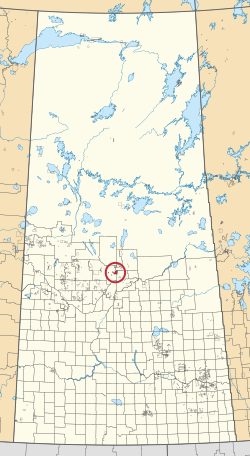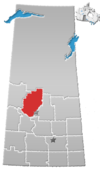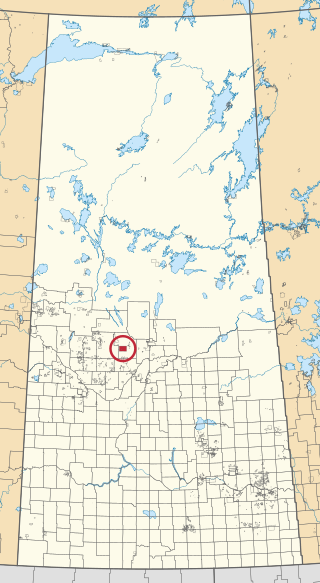
Ahtahkakoop 104 is an Indian reserve of the Ahtahkakoop Cree Nation in Saskatchewan. It is 72 kilometers northwest of Prince Albert. In the 2016 Canadian Census, it recorded a population of 1472 living in 386 of its 424 total private dwellings. In the same year, its Community Well-Being index was calculated at 46 of 100, compared to 58.4 for the average First Nations community and 77.5 for the average non-Indigenous community.
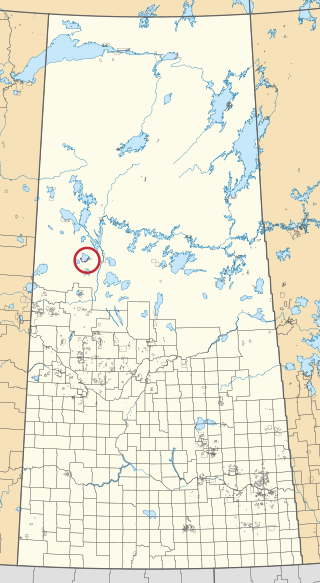
Canoe Lake 165 is an Indian reserve of the Canoe Lake Cree First Nation in the boreal forest of northern Saskatchewan, Canada. Its location is on Canoe Lake approximately thirty miles west of Beauval, within the ancient hunting grounds of the Woodland Cree. In the 2016 Canadian Census, it recorded a population of 912 living in 250 of its 273 total private dwellings. In the same year, its Community Well-Being index was calculated at 53 of 100, compared to 58.4 for the average First Nations community and 77.5 for the average non-Indigenous community. The reserve includes the settlement of Canoe Narrows. The name of the reserve and the settlement in Cree is nêhiyaw-wapâsihk ᓀᐦᐃᔭᐤ ᐘᐹᓯᕽ.
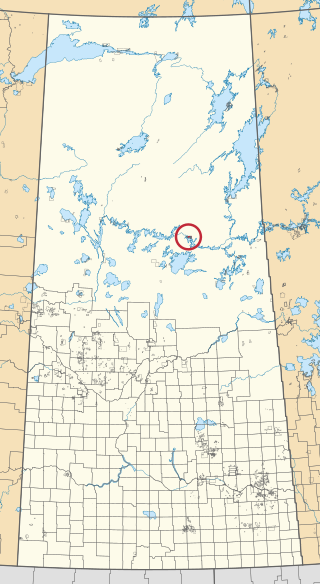
Grandmother's Bay 219 is an Indian reserve of the Lac La Ronge Indian Band in Saskatchewan. Located on Otter Lake, part of the Churchill River system, it is 77 kilometers northeast of Lac la Ronge. In the 2016 Canadian Census, it recorded a population of 342 living in 101 of its 115 total private dwellings. In the same year, its Community Well-Being index was calculated at 44 of 100, compared to 58.4 for the average First Nations community and 77.5 for the average non-Indigenous community.

Seekaskootch 119 is an Indian reserve of the Onion Lake Cree Nation in Saskatchewan. It is 142 kilometres northwest of North Battleford. In the 2016 Canadian Census, it recorded a population of 2574 living in 578 of its 639 total private dwellings. In the same year, its Community Well-Being index was calculated at 53 of 100, compared to 58.4 for the average First Nations community and 77.5 for the average non-Indigenous community.

Beardy's 97 and Okemasis 96 is an Indian reserve of the Beardy's and Okemasis' Cree Nation in Saskatchewan. It is 58 kilometres southwest of Prince Albert. In the 2016 Canadian Census, it recorded a population of 1323 living in 301 of its 311 total private dwellings. In the same year, its Community Well-Being index was calculated at 52 of 100, compared to 58.4 for the average First Nations community and 77.5 for the average non-Indigenous community.

Chitek Lake 191 is an Indian reserve of the Pelican Lake First Nation in the Canadian province of Saskatchewan. It is located on the southern shore of Chitek Lake about 68 kilometres (42 mi) south-east of Meadow Lake. In the 2016 Canadian Census, it recorded a population of 821 living in 164 of its 300 total private dwellings. In the same year, its Community Well-Being index was calculated at 46 of 100, compared to 58.4 for the average First Nations community and 77.5 for the average non-Indigenous community.

Cote 64 is an Indian reserve of the Cote First Nation in Saskatchewan. It is 16 kilometres west of the Manitoba border. In the 2016 Canadian Census, it recorded a population of 748 living in 220 of its 269 total private dwellings. In the same year, its Community Well-Being index was calculated at 51 of 100, compared to 58.4 for the average First Nations community and 77.5 for the average non-Indigenous community.

Keeseekoose 66 is an Indian reserve of the Keeseekoose First Nation in Saskatchewan. It is 16 kilometres north of Kamsack. In the 2016 Canadian Census, it recorded a population of 491 living in 135 of its 155 total private dwellings. In the same year, its Community Well-Being index was calculated at 50 of 100, compared to 58.4 for the average First Nations community and 77.5 for the average non-Indigenous community.

Little Red River 106C is an Indian reserve of the Lac La Ronge Indian Band in Saskatchewan. It is 34 kilometres north of Prince Albert. In the 2016 Canadian Census, it recorded a population of 354 living in 88 of its 98 total private dwellings. In the same year, its Community Well-Being index was calculated at 48 of 100, compared to 58.4 for the average First Nations community and 77.5 for the average non-Indigenous community.

Ministikwan 161A is an Indian reserve of the Ministikwan Lake Cree Nation in Saskatchewan. It is 177 kilometres northwest of North Battleford. In the 2016 Canadian Census, it recorded a population of 223 living in 40 of its 42 total private dwellings. In the same year, its Community Well-Being index was calculated at 35 of 100, compared to 58.4 for the average First Nations community and 77.5 for the average non-Indigenous community.
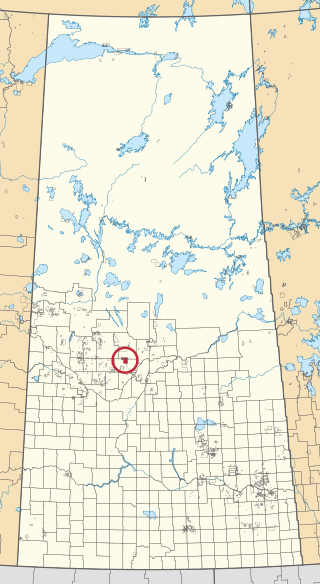
Mistawasis 103 is an Indian reserve of the Mistawasis Nêhiyawak in Saskatchewan. It is 68 kilometres west of Prince Albert. In the 2016 Canadian Census, it recorded a population of 681 living in 175 of its 180 total private dwellings. In the same year, its Community Well-Being index was calculated at 42 of 100, compared to 58.4 for the average First Nations community and 77.5 for the average non-Indigenous community.
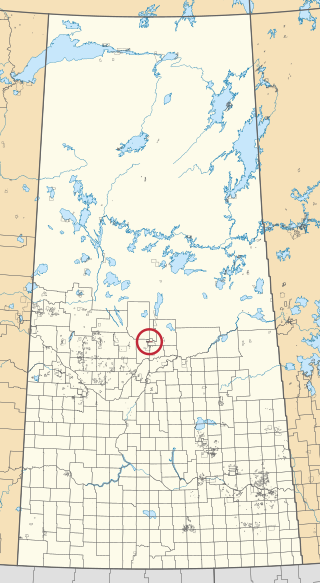
Montreal Lake 106B is an Indian reserve of the Montreal Lake Cree Nation in Saskatchewan. It is adjacent to Little Red River 106C and 39 kilometres (24 mi) north of Prince Albert. In the 2016 Canadian Census, it recorded a population of 442 living in 113 of its 118 total private dwellings. In the same year, its Community Well-Being index was calculated at 47 of 100, compared to 58.4 for the average First Nations community and 77.5 for the average non-Indigenous community.

Moosomin 112B is an Indian reserve of the Moosomin First Nation in Saskatchewan. It is 32 kilometres north of North Battleford. In the 2016 Canadian Census, it recorded a population of 724 living in 183 of its 195 total private dwellings. In the same year, its Community Well-Being index was calculated at 48 of 100, compared to 58.4 for the average First Nations community and 77.5 for the average non-Indigenous community.

Morin Lake 217 is an Indian reserve of the Lac La Ronge Indian Band in Saskatchewan. It is 24 kilometres east of Lac la Ronge. In the 2016 Canadian Census, it recorded a population of 577 living in 135 of its 155 total private dwellings. In the same year, its Community Well-Being index was calculated at 45 of 100, compared to 58.4 for the average First Nations community and 77.5 for the average non-Indigenous community.

Muskeg Lake 102 is an Indian reserve of the Muskeg Lake Cree Nation in Saskatchewan. It is 93 kilometres north of Saskatoon. In the 2016 Canadian Census, it recorded a population of 274 living in 104 of its 112 total private dwellings. In the same year, its Community Well-Being index was calculated at 57 of 100, compared to 58.4 for the average First Nations community and 77.5 for the average non-Indigenous community.

One Arrow 95 is an Indian reserve of the One Arrow First Nation in Saskatchewan. It is 53 kilometres southwest of Prince Albert. In the 2016 Canadian Census, it recorded a population of 680 living in 163 of its 168 total private dwellings. In the same year, its Community Well-Being index was calculated at 49 of 100, compared to 58.4 for the average First Nations community and 77.5 for the average non-Indigenous community.
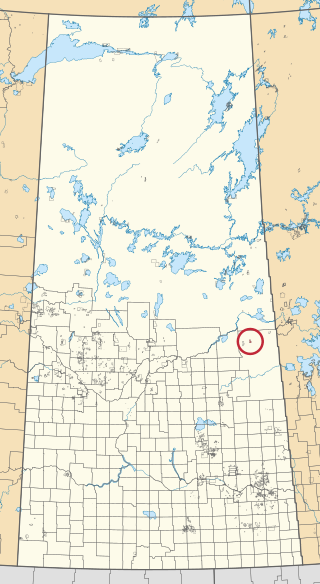
Shoal Lake 28A is an Indian reserve of the Shoal Lake Cree Nation in Saskatchewan. It is 92 kilometres east of Nipawin. In the 2016 Canadian Census, it recorded a population of 424 living in 115 of its 118 total private dwellings. In the same year, its Community Well-Being index was calculated at 46 of 100, compared to 58.4 for the average First Nations community and 77.5 for the average non-Indigenous community.

Sturgeon Weir 184F is an Indian reserve of the Peter Ballantyne Cree Nation in Saskatchewan. It is 55 kilometres southeast of Flin Flon. In the 2016 Canadian Census, it recorded a population of 81 living in 20 of its 26 total private dwellings. In the same year, its Community Well-Being index was calculated at 51 of 100, compared to 58.4 for the average First Nations community and 77.5 for the average non-Indigenous community.

Whitecap 94 is an Indian reserve of the Whitecap Dakota First Nation in Saskatchewan. It is 29 kilometres south of Saskatoon, near Dundurn. In the 2016 Canadian Census, it recorded a population of 451 living in 145 of its 166 total private dwellings. In the same year, its Community Well-Being index was calculated at 73 of 100, compared to 58.4 for the average First Nations community and 77.5 for the average non-Indigenous community.
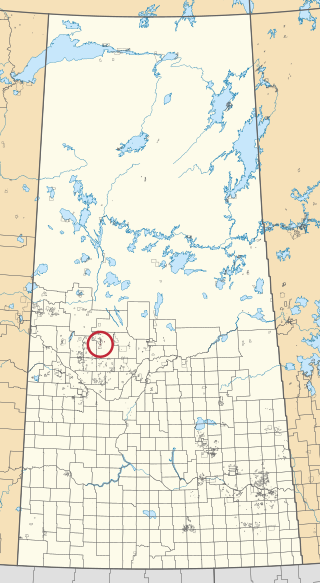
Witchekan Lake 117D is an Indian reserve of the Witchekan Lake First Nation in Saskatchewan. It is 16 kilometres north of Spiritwood. In the 2016 Canadian Census, it recorded a population of 325 living in 73 of its 80 total private dwellings. In the same year, its Community Well-Being index was calculated at 46 of 100, compared to 58.4 for the average First Nations community and 77.5 for the average non-Indigenous community.
